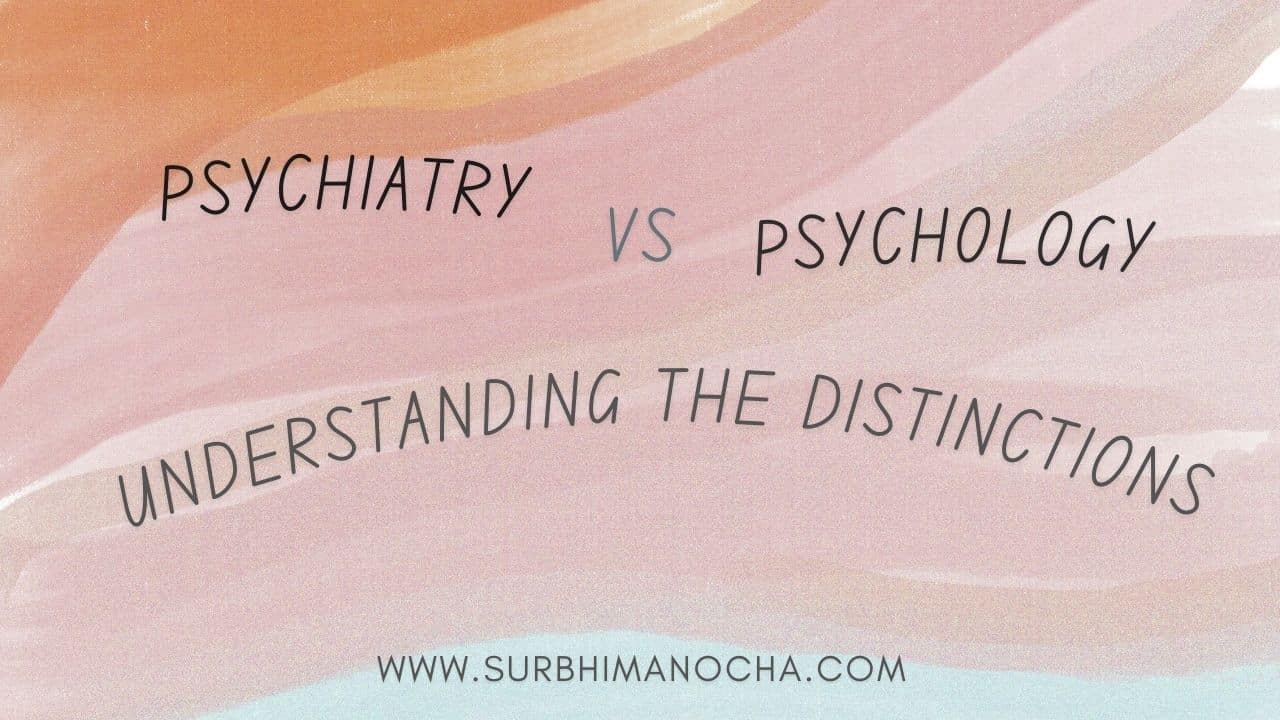Home » Psychiatry vs. Psychology: Understanding the Difference
Psychiatry vs. Psychology: Understanding the Difference

In the past decade, the words psychology and psychiatry have come to dissociate from their common misconceived notion of study or treatment of madness/mad people. However, a lot of confusion and misconceptions regarding the two disciplines (yes they are not the same!) still linger in society and need to be resolved. In this article, we aim to clarify the distinctions between psychiatry and psychology – from both career and treatment perspectives.
Let’s start with the big question – Who is the “real” doctor? – a psychiatrist or psychologist. Both psychiatrists and psychologists can have doctorate degrees. They can both use the title of doctor. While a psychiatrist can prescribe you pharmaceutical drugs to treat your condition, a psychologist cannot. This distinction becomes a little clearer when we navigate each of their career paths.
A psychiatrist pursues a medical degree (undergraduate) from a medical school (e.g.: graduating (MBBS) from AIIMS) and then goes on to specialize in Psychiatry in their residency. A psychologist on the other hand pursues a psychology degree at the undergraduate level (BSc. Or BA) and masters/graduate level and/or PhD level. The ones that go on till the Ph.D. level hence get their title. However, psychology is vast – it includes clinical, sports, social, developmental, organizational and many more fields. People usually choose their area of focus within psychology at the masters level. It is the clinical psychologist or commonly known as a therapist that is most often confused with a psychiatrist. Hence, whatever distinctions we do talk about going forward in this article will be in reference to a clinical psychologist and psychiatrist.
The fact that clinical psychologists cannot prescribe medicines does not dismiss their credibility as experts in their fields. They can, and do, diagnose their clients with various mental health disorders using the criteria from either the DSM 5, Diagnostic and Statistical Manual 5 or the ICD-11, International Classification of Diseases. These are both manuals which provide standardized classifications and diagnostic criteria for various medical conditions and mental health disorders.
The DSM (Diagnostic and Statistical Manual of Mental Disorders) focuses on mental health, while the ICD (International Classification of Diseases) covers a wide range of medical conditions. They are used by mental health professionals worldwide. Clinical psychologists can also suggest treatment in terms of various forms of therapy, for eg: play therapy for autism or cognitive behavioral therapy for OCD. Usually, psychologists use various forms of therapy to treat a mental condition, instead of medicines. They can also suggest changes in routine to assist with the treatment.
Psychologists can take behavioral (focusing on learning), psychodynamic (focusing on the unconscious), mindfulness or other kinds of approaches to their treatment. They often use a combination of different approaches as mentioned before. Psychiatrists, however, focus on the medical and biological aspects of a mental health condition and aim to tackle that.
Psychologists can be found in various work environments, which vary based on their specific roles. The majority tend to work in health practitioner offices, manage private practices or could be employed in schools, workplaces etc. In contrast, psychiatrists predominantly practice in hospital settings but may also establish private practices or provide their expertise in diverse settings such as nursing homes, health practitioner offices, military contexts, hospice programs, and various other venues.
Interestingly, there are many times when psychologists and psychiatrists collaborate. This includes conducting assessments to diagnose mental health disorders together as well as treatment. Treatment is often a combination of counseling and medication, with psychologists referring clients to psychiatrists for medication when needed. Conversely, psychiatrists too refer patients to psychologists for psychotherapy. They also consult each other directly about clients, especially when working together in the same hospital setting.
Expand Your Horizons:
Browse Our Other Informative Reads
Get Started Booking Your Appointment is
Just a Click Away
-
Select Location
-
Select booking
-
Select Service
-
Select Date & Time
-
Enter Information
-
Payment Method
-
Verify Order Details
-
Confirmation
